Daily Vocabulary Words: List of Daily Used Words in Leading Indian Newspapers
Hi there. Welcome to this special section @ Wordpandit. Our endeavour here is straightforward: highlighting daily vocabulary words that you would come across in leading newspapers in the country. We have included the following newspapers in our selection:
• The Times of India
• The Economic Times
• Hindustan Times
• Mint
• Indian Express
We are putting in extensive work to develop your vocabulary. All you have to do is be regular with this section and check out this post daily. This is your repository of commonly used words; essentially, we are posting a list of daily used words. Hence, this has significant practical application as it teaches you words that are commonly used in leading publications mentioned above.
Visit the website daily to learn words from leading Indian newspapers.
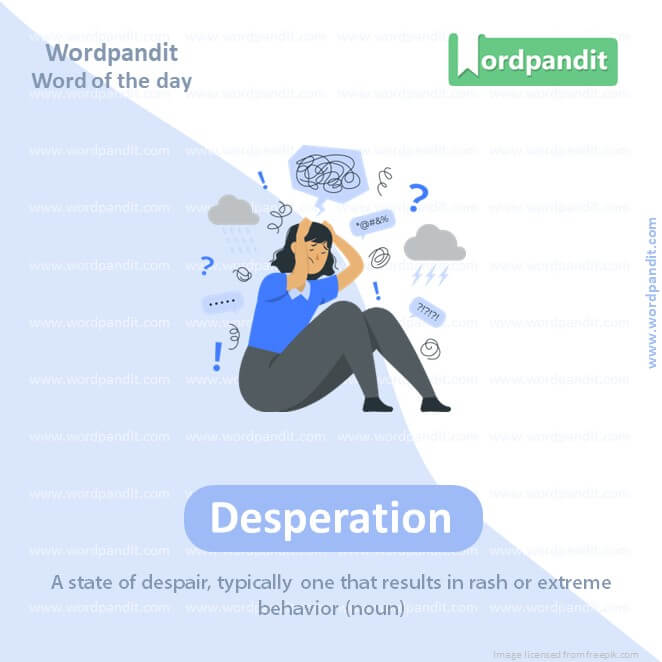
WORD-1: Desperation
CONTEXT: Many enterprising Indians have left the shores of Gujarat over the centuries in search of fortune and opportunity. India of the 2020s is, however, making them leave in desperation.
SOURCE: Indian Express
EXPLANATORY PARAGRAPH: Desperation is when you feel really, really needing or wanting something, and you can’t think of anything else. It’s like when you are so thirsty that all you can think about is getting a drink of water.
MEANING: A state of despair, typically one that results in rash or extreme behavior (noun).
PRONUNCIATION: des-puh-RAY-shun
SYNONYMS: Hopelessness, Despair, Distress, Urgency, Frenzy, Anguish, Extremity.
USAGE EXAMPLES:
1. In his desperation, he made a risky decision.
2. She felt a sense of desperation when she lost her job.
3. The drought led to desperation among the farmers.
4. There was a note of desperation in his voice.
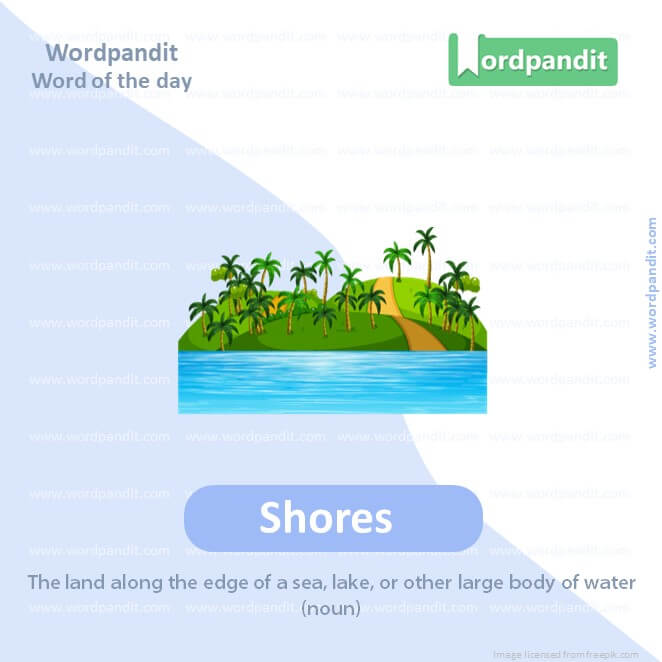
WORD-2: Shores
CONTEXT: Many enterprising Indians have left the shores of Gujarat over the centuries in search of fortune and opportunity. India of the 2020s is, however, making them leave in desperation.
SOURCE: Indian Express
EXPLANATORY PARAGRAPH: Shores are the edges of land along the sea, a lake, or a river. Think about when you go to the beach and the sand meets the water – that sandy part is the shore. It’s where you can play and build sandcastles!
MEANING: The land along the edge of a sea, lake, or other large body of water (noun).
PRONUNCIATION: shors
SYNONYMS: Coastline, Beach, Seaside, Coast, Waterfront, Bank, Seashore.
USAGE EXAMPLES:
1. We walked along the sandy shores of the beach.
2. The boat sailed close to the island’s shores.
3. Birds were nesting along the lake’s shores.
4. The waves crashed against the rocky shores.
WORD-3: Tremendous
CONTEXT: “Gujarat’s development journey has received tremendous praise both across India and the world” — claimed an April 2014 article titled ‘The Gujarat Model’ on the website narendramodi.in.
SOURCE: Indian Express
EXPLANATORY PARAGRAPH: Tremendous means something is really big, really good, or a lot. It’s like when you see a huge mountain and think it’s so big, or when you have so much fun at a party, you think it’s tremendous!
MEANING: Very great in amount, scale, or intensity (adjective).
PRONUNCIATION: truh-MEN-duhs
SYNONYMS: Huge, Enormous, Immense, Fantastic, Great, Marvelous, Extraordinary.
USAGE EXAMPLES:
1. She had a tremendous amount of work to do.
2. The news had a tremendous impact on everyone.
3. He showed tremendous courage during the rescue.
4. The play received tremendous applause.
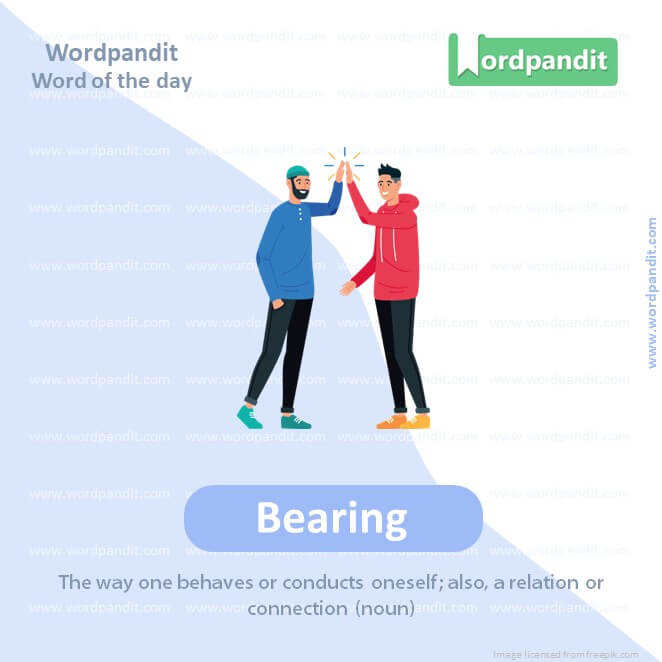
WORD-4: Bearing
CONTEXT: If desperate Indians are jumping ship and bearing ordeals in search of decent livelihood, the country’s wealthy, the so-called “high net worth individuals” (HNIs), are buying golden visas to settle overseas.
SOURCE: Indian Express
EXPLANATORY PARAGRAPH: Bearing is about how you hold or carry yourself, like standing tall and confident. It’s also how you relate or connect to something, like when you find out where you are by looking at a map.
MEANING: The way one behaves or conducts oneself; also, a relation or connection (noun).
PRONUNCIATION: BAYR-ing
SYNONYMS: Demeanor, Manner, Attitude, Presence, Conduct, Relation, Connection.
USAGE EXAMPLES:
1. She carried herself with a confident bearing.
2. His bearing was calm and collected.
3. The news has no direct bearing on our plans.
4. He checked the compass for his bearing.
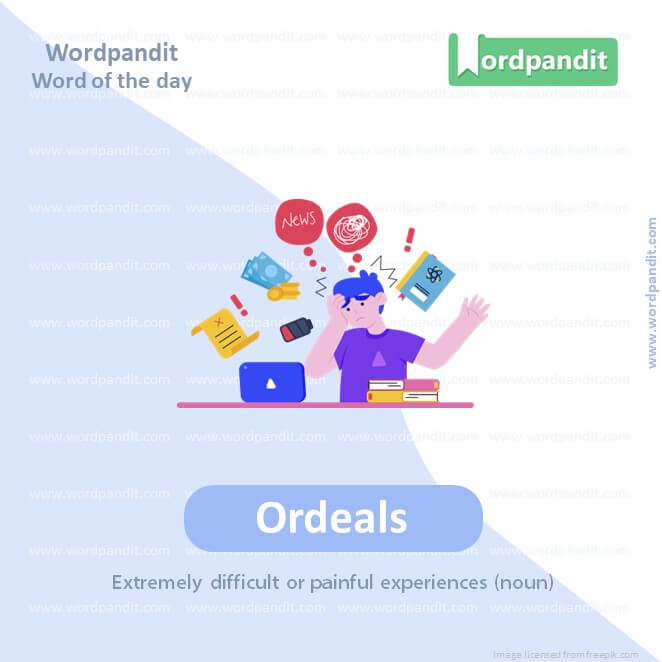
WORD-5: Ordeals
CONTEXT: If desperate Indians are jumping ship and bearing ordeals in search of decent livelihood, the country’s wealthy, the so-called “high net worth individuals” (HNIs), are buying golden visas to settle overseas.
SOURCE: Indian Express
EXPLANATORY PARAGRAPH: Ordeals are like really tough or painful experiences. Think about when you have to do something really hard, like taking a long test or going to the dentist, that can feel like an ordeal.
MEANING: Extremely difficult or painful experiences (noun).
PRONUNCIATION: or-DEELS
SYNONYMS: Trials, Tribulations, Hardships, Tests, Challenges, Difficulties, Struggles.
USAGE EXAMPLES:
1. Surviving the storm was an ordeal for the sailors.
2. He recounted the ordeals of his early life.
3. The trek through the mountains was an ordeal.
4. Recovering from the illness was a long ordeal.
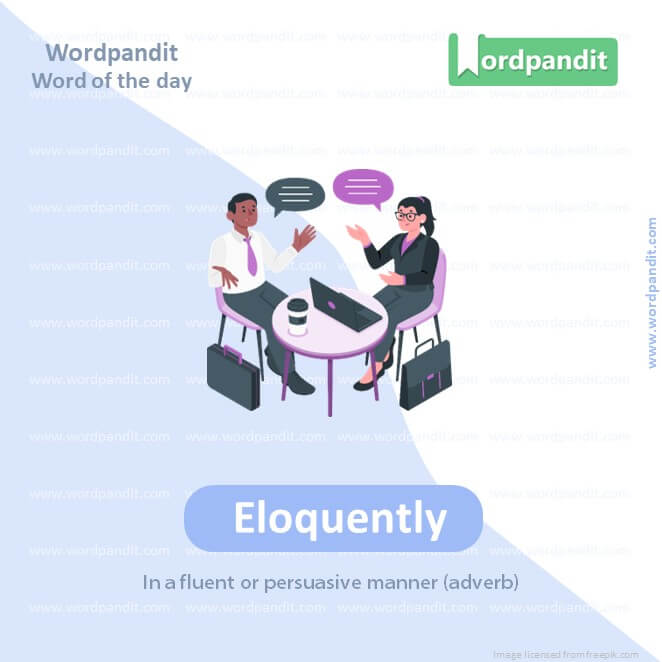
WORD-6: Eloquently
CONTEXT: Time was when Indians complained about enforced migration. Novelists and historians have written eloquently about the fate of “indentured labour”, lured from their villages with the false promise of a better life and then pushed into slavery and drudgery. That was British India.
SOURCE: Indian Express
EXPLANATORY PARAGRAPH: Eloquently is when someone speaks or writes in a way that is really beautiful and effective. It’s like when someone tells a story so well that everyone listens carefully because it sounds so good.
MEANING: In a fluent or persuasive manner (adverb).
PRONUNCIATION: EL-o-kwent-lee
SYNONYMS: Articulately, Persuasively, Expressively, Effectively, Convincingly, Impressively, Fluently.
USAGE EXAMPLES:
1. She spoke eloquently about her experiences.
2. The author wrote eloquently on the subject.
3. He argued his case most eloquently.
4. Her eloquently expressed ideas won the audience’s admiration.
WORD-7: Lured
CONTEXT: Time was when Indians complained about enforced migration. Novelists and historians have written eloquently about the fate of “indentured labour”, lured from their villages with the false promise of a better life and then pushed into slavery and drudgery.
SOURCE: Indian Express
EXPLANATORY PARAGRAPH: Lured means to attract someone to do something, often by promising them something good. It’s like when you’re promised a treat if you finish your homework. You’re being lured by the treat!
MEANING: Tempted to do something or go somewhere, usually by the promise of reward (verb).
PRONUNCIATION: loord
SYNONYMS: Tempted, Attracted, Enticed, Seduced, Persuaded, Coaxed, Drawn in.
USAGE EXAMPLES:
1. He was lured into the trap.
2. The shop lured customers with big discounts.
3. She was lured away from her work by the promise of fun.
4. The aroma of the food lured him into the kitchen.
WORD-8: Drudgery
CONTEXT: Time was when Indians complained about enforced migration. Novelists and historians have written eloquently about the fate of “indentured labour”, lured from their villages with the false promise of a better life and then pushed into slavery and drudgery.
SOURCE: Indian Express
EXPLANATORY PARAGRAPH: Drudgery is when you have to do boring or hard work that you don’t enjoy. It’s like when you have to clean your room and it feels like it takes forever and isn’t fun at all.
MEANING: Dull, hard, and uninteresting work (noun).
PRONUNCIATION: DRUHJ-uh-ree
SYNONYMS: Toil, Labor, Grind, Chore, Monotony, Tediousness, Hard work.
USAGE EXAMPLES:
1. She found housework to be a drudgery.
2. The drudgery of his daily routine was tiring.
3. He wanted to escape the drudgery of his office job.
4. The project turned out to be sheer drudgery.
WORD-9: Indentured
CONTEXT: Interestingly, though, neither the indentured labour of the colonial era nor the working class in the Gulf region chose to return home.
SOURCE: Indian Express
EXPLANATORY PARAGRAPH: Indentured is when someone is bound by a legal agreement to work for someone else for a certain amount of time. It’s like having a really long contract to do a job or task for someone.
MEANING: Bound by a formal agreement to work for someone for a fixed time, often in exchange for learning a skill or trade (adjective).
PRONUNCIATION: in-DEN-churd
SYNONYMS: Bound, Contracted, Obligated, Tied, Committed, Engaged, Enlisted.
USAGE EXAMPLES:
1. He was indentured as an apprentice to a carpenter.
2. The indentured workers came to the new land seeking opportunities.
3. She signed an indentured contract for two years.
4. Indentured servitude was common in the past.
WORD-10: Diaspora
CONTEXT: With over 20 lakh Indians migrating overseas every year, the regionally and professionally diversified Indian diaspora is now close to 30 million and non-resident Indians are now more than non-resident Chinese.
SOURCE: Indian Express
EXPLANATORY PARAGRAPH: Diaspora is a big word that means people who come from the same country or have the same culture but live in many different parts of the world. It’s like when people from one country live in many other countries, but they still share their traditions and stories.
MEANING: A group of people who come from the same country but live scattered in different parts of the world (noun).
PRONUNCIATION: dye-AS-puh-ruh
SYNONYMS: Expatriates, Emigrants, Exiles, Community, Overseas group, Scattered population, Migrant group.
USAGE EXAMPLES:
1. The Indian diaspora is spread across many countries.
2. The festival celebrated the culture of the Jewish diaspora.
3. He studied the diaspora of Italian artists.
4. The diaspora maintains strong ties to their homeland.
Vocabulary Definition
Understanding a language requires a deep grasp of the ‘vocabulary definition’. These precise meanings of words shape our understanding and communication. However, to successfully learn ‘vocabulary definition’, one must do more than just memorize a dictionary. So what’s the perfect approach to assimilating ‘vocabulary definition’?
The compelling answer is context. To truly comprehend ‘vocabulary definition’, expose yourself to diverse reading materials such as books, magazines, newspapers, and digital content. This approach equips you with a practical understanding of ‘vocabulary definition’ and illuminates the nuanced ways in which they get employed in conversation and writing.
An innovative way to enhance memory while learning ‘vocabulary definition’ involves visualization. By creating a mental image representing the definition, your brain can help cement the association between the word and its meaning, improving recall capability significantly.
Now, understanding and retaining ‘vocabulary definition’ is only one part of the equation. The other, equally essential part is application. Actively using these words in your personal conversations, professional communication, or social media posts will reinforce your understanding and usage of ‘vocabulary definition’.
Interactive language tools can be a great help when mastering ‘vocabulary definition’. Language-learning software and applications often provide comprehensive word definitions, examples, and even quizzes to test your learning progress.
In conclusion, the journey of embracing ‘vocabulary definition’ demands a blended approach. Diversified reading materials, visualization techniques, active application, and the leverage of modern language-learning tools together chart a pathway to mastering ‘vocabulary definition’. Remember, every word definition you conquer is a stepping stone leading you to the magnificent mansion of language proficiency. Happy learning!













